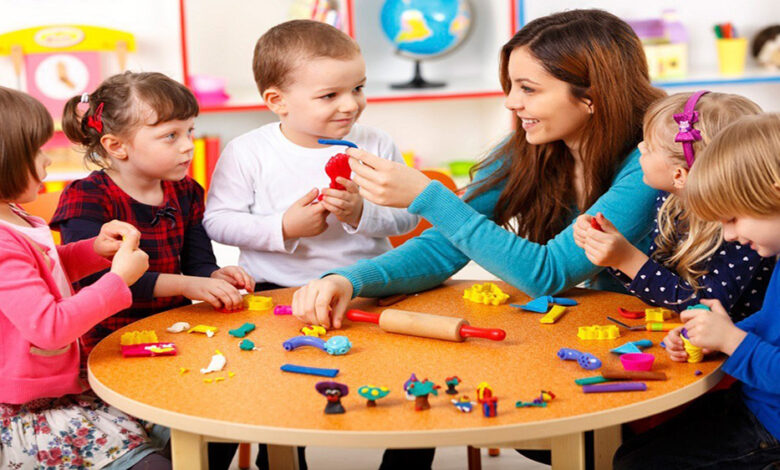The Complete Parent’s Guide To Choosing The Best Child Day Care

1. Understanding the Importance of Quality Child Day Care
Child day care is more than just a service that allows parents to have a few hours of free time. It plays a crucial role in a child’s development and overall well-being. The environment, activities, and interactions in a quality child day care program can have a profound impact on a child’s physical, emotional, and cognitive growth.
Why Quality Child Day Care Matters for Your Child’s Development
A child’s early years are a critical period for brain development. Quality child day care programs provide a nurturing and stimulating environment that supports this development. Children engage in age-appropriate activities that promote learning, creativity, and socialization skills.
Research has shown that children who attend high-quality child day care programs tend to have better cognitive and language skills, as well as stronger social and emotional development. They are more likely to excel academically and have higher self-esteem compared to children who do not receive this type of early care.
The Benefits of Enrolling Your Child in a Trusted Child Day Care Center
Enrolling your child in a trusted child day care center offers numerous benefits for both you and your child. Firstly, it provides a structured and supervised environment where your child can learn and grow. Qualified caregivers and educators design activities that support your child’s development and provide opportunities for them to explore their interests and build skills.
Moreover, high-quality child day care centers often have low staff-to-child ratios, ensuring that each child receives individual attention and care. This promotes a nurturing and supportive environment where your child can thrive. Additionally, many child day care centers have age-appropriate curricula that focus on early literacy, numeracy, and social skills, giving your child a head start in their educational journey.
Factors to Consider When Choosing a Quality Child Day Care Program
When choosing a quality child day care program, there are several factors to consider. Firstly, consider the program’s reputation and accreditation. Look for centers that have received recognition from reputable organizations and have positive reviews from parents.
It is also important to consider the program’s educational philosophy and curriculum. Look for programs that prioritize age-appropriate activities, stimulating learning opportunities, and a balance between structured and unstructured play. Additionally, consider the center’s approach to discipline, communication with parents, and involvement of families in the child’s care and development.
Other factors to consider include the qualifications and experience of the staff, the cleanliness and safety of the facility, the availability of nutritious meals and snacks, and the overall cost and convenience of the program.
2. Evaluating Child Day Care Options in Your Area
Once you understand the importance of quality child day care and the factors to consider, it’s time to evaluate the options available in your area. This step requires thorough research and comparison to ensure you find the best fit for your child and family.
Different Types of Child Day Care Programs and their Pros and Cons
Child day care programs can vary in their structure, approach, and services. Understanding the different types of child day care programs can help you make an informed decision.
One popular option is a center-based day care program, which usually operates in a dedicated facility and offers age-appropriate activities and educational curricula. These programs often have qualified teachers and a structured daily routine. However, they can be more expensive and have limited availability.
Another option is family or home-based child day care, where a caregiver looks after a small group of children in their own home. This option can provide a more intimate and personalized environment, but it may have fewer resources and opportunities for socialization.
Finally, there are employer-sponsored child day care programs, which some companies offer as a benefit to their employees. These programs can provide convenience and may have discounted rates, but they may have limited availability and restrictions based on your employment situation.
When evaluating these options, consider your child’s personality, needs, and preferences, as well as your own schedule, budget, and priorities.
How to Research and Compare Child Day Care Centers in Your Area
Researching and comparing child day care centers in your area is essential to find the right fit for your child. Start by asking for recommendations from friends, family, neighbors, and colleagues who have had positive experiences with child care centers.
Next, conduct online research to gather information about local child day care centers. Visit their websites to learn about their philosophy, programs, staff qualifications, and accreditation. Look for any awards or recognitions they have received.
Once you have a list of potential centers, schedule visits to get a firsthand look at the facilities. During the visit, pay attention to the cleanliness, organization, and safety measures in place. Observe how the staff interacts with the children and ask about their qualifications and experience. Don’t hesitate to ask questions about the educational curriculum, daily routines, and policies.
Take note of your overall impressions and gather feedback from other parents who have their children enrolled in the centers you are considering. This will help you gain insights into the day-to-day experience and the satisfaction of current parents.
Considering Location, Hours, and Transportation for Convenient Child Care
In addition to the quality and reputation of the child day care center, it’s important to consider practical factors such as location, hours, and transportation.
Choosing a child day care center that is conveniently located to your home or workplace can save you time and reduce stress. Consider the commute and whether the center is easily accessible from your usual route.
Furthermore, evaluate the operating hours of the child day care center. Ensure that the center’s hours align with your work schedule or other commitments. Some centers may offer extended hours or flexibility for parents with non-traditional schedules.
Transportation is another factor to consider, especially if you require transportation to and from the center. Inquire if the center provides transportation services or if there are any public transportation options available.
By considering these practical factors, you can ensure that the child day care center you choose fits seamlessly into your daily routine.
3. Assessing Key Factors for a Safe and Secure Child Day Care Environment
Safety and security are paramount when it comes to selecting a child day care center. Assessing key factors related to safety and security can give you peace of mind and ensure your child’s well-being.
The Importance of Safety and Security Measures in Child Day Care Centers
A safe and secure environment is essential for a child’s well-being. Child day care centers should have comprehensive safety and security measures in place to protect the children in their care.
These measures may include secure entrances with controlled access, surveillance cameras, regular safety drills, and protocols for emergency situations. Staff members should be trained in CPR and first aid, and the center should have clear policies on administering medication, handling allergies, and preventing accidents.
Prioritize child day care centers that have strong emergency preparedness plans and clear communication strategies in place to keep parents informed in case of any incidents or emergencies.
Understanding Staff-to-Child Ratios and Qualifications
The staff-to-child ratio is an important factor in ensuring individualized care and supervision. Lower ratios allow caregivers to provide more attention, nurture relationships, and respond promptly to each child’s needs.
Each state or country may have specific regulations regarding staff-to-child ratios for different age groups. Ensure that the child day care center you are considering adheres to these regulations and preferably maintains ratios that are lower than the minimum requirements.
Additionally, consider the qualifications and experience of the staff members. Ideally, the center should have well-trained, certified, and experienced caregivers who are knowledgeable about child development, safety procedures, and behavior management strategies. Ask about the center’s staff retention rates, as consistency in caregivers can contribute to a child’s sense of security and comfort.
Examining the Facility, Cleanliness, and Hygiene Standards
The physical environment of a child day care center plays a significant role in your child’s health and safety. During your visit, thoroughly examine the facilities, paying attention to cleanliness and hygiene standards.
Look for clean and well-maintained playrooms, bathrooms, and eating areas. Ask about the center’s policies and practices regarding handwashing, diaper changing, and sanitization of toys and equipment. Ensure that there is appropriate space for age-appropriate activities and that the outdoor play area is safe and secure.
It is also important to inquire about the center’s protocols for illness prevention and management. Find out their policies on sick children, vaccinations, and medication administration.
By carefully assessing these key factors, you can select a child day care center that prioritizes the safety and well-being of your child.
4. Nurturing Your Child’s Growth and Development in Child Day Care
Child day care should not only provide a safe and secure environment but also offer opportunities for your child’s growth and development. Here, we will explore how child day care programs contribute to various aspects of your child’s development.
Emphasizing Learning and Developmental Activities in Child Care Programs
High-quality child day care programs incorporate learning and developmental activities into their daily routines. They provide a range of age-appropriate activities that stimulate your child’s physical, cognitive, and social-emotional development.
These activities may include art and craft projects, sensory play, music and movement sessions, storytelling, pre-reading and pre-writing activities, and outdoor play. They are designed to promote creativity, problem-solving skills, language development, fine and gross motor skills, and social interaction.
Child care providers play a crucial role in encouraging and facilitating your child’s learning and development. They observe each child, identify their interests and strengths, and tailor activities to meet their individual needs. They provide guidance, support, and encouragement, fostering a love for learning and exploration.
The Role of Nutrition and Meal Plans in Supporting Your Child’s Well-being
Proper nutrition is essential for your child’s overall well-being and development. Child day care centers often provide meals and snacks as part of their program, ensuring that children receive balanced and nutritious meals.
When evaluating child day care centers, inquire about their meal plans and menus. Look for centers that prioritize fresh and wholesome ingredients, offer a variety of foods, and accommodate any dietary restrictions or allergies. Consider whether the meals are prepared on-site or delivered from external services.
Additionally, discuss with the center how they handle mealtime routines, encourage table manners, and promote healthy eating habits. A child day care center that places importance on nutrition contributes to your child’s physical health and lays the foundation for lifelong healthy habits.
Promoting Socialization and Social Skills in a Child Day Care Setting
Child day care centers provide an ideal setting for children to develop social skills and interact with peers. Regular socialization opportunities facilitate the development of communication skills, empathy, cooperation, and conflict resolution.
Child care providers create a supportive environment where children can learn to share, take turns, express their feelings, and develop friendships. Through group activities, dramatic play, and cooperative games, children learn to navigate social dynamics and develop a sense of belonging.
Furthermore, child day care centers often organize special events and outings where children can interact with a broader community, such as visiting local parks, libraries, or inviting guest speakers. These experiences broaden their horizons, expose them to different cultures and perspectives, and foster a sense of community.
By enrolling your child in a child day care center that prioritizes socialization, you are providing them with a foundation for positive social interactions and relationships.
Choosing the best child day care requires careful consideration of multiple factors. By understanding the importance of quality child day care, evaluating options in your area, assessing safety and security measures, and considering your child’s growth and development, you can make an informed decision that sets your child on a path to success.
FAQ
Question: How does quality child day care impact a child’s development?
A quality child day care program provides a nurturing and stimulating environment that supports a child’s physical, emotional, and cognitive growth. Children engage in age-appropriate activities that promote learning, creativity, and socialization skills. Research has shown that children who attend high-quality child day care programs tend to have better cognitive and language skills, as well as stronger social and emotional development. They are more likely to excel academically and have higher self-esteem compared to children who do not receive this type of early care.
Question: What should I consider when choosing a quality child day care program?
When choosing a quality child day care program, consider factors such as the program’s reputation and accreditation, educational philosophy and curriculum, qualifications and experience of the staff, cleanliness and safety of the facility, availability of nutritious meals and snacks, and overall cost and convenience of the program.
Question: What are the different types of child day care programs?
Child day care programs can vary in their structure, approach, and services. Some options include center-based day care programs, family or home-based child day care, and employer-sponsored child day care programs. Each option has its pros and cons, so consider your child’s needs and your own priorities when evaluating these options.
Question: How can I research and compare child day care centers in my area?
Start by asking for recommendations from friends, family, neighbors, and colleagues who have had positive experiences with child care centers. Conduct online research to gather information about local child day care centers, visit their websites to learn about their philosophy, programs, and staff qualifications. Schedule visits to potential centers to get a firsthand look at the facilities and gather feedback from other parents who have their children enrolled.
Question: What factors should I assess for a safe and secure child day care environment?
Assess factors such as safety and security measures in place, staff-to-child ratios, qualifications of the staff, cleanliness and hygiene standards of the facility, and protocols for illness prevention and management. Prioritize child day care centers that have comprehensive safety measures, low staff-to-child ratios, and maintain high cleanliness and hygiene standards.
Question: What activities can I expect child day care programs to provide?
High-quality child day care programs incorporate learning and developmental activities into their daily routines. These activities may include art and craft projects, sensory play, music and movement sessions, storytelling, pre-reading and pre-writing activities, and outdoor play. Child care providers play a crucial role in encouraging and facilitating a child’s learning and development.
Question: How important is nutrition in a child day care program?
Proper nutrition is essential for a child’s overall well-being and development. Child day care centers often provide meals and snacks as part of their program. When evaluating child day care centers, inquire about their meal plans and menus, and consider whether the meals are nutritious and accommodate any dietary restrictions or allergies. A child day care center that prioritizes nutrition contributes to a child’s physical health and lays the foundation for lifelong healthy habits.
Question: How do child day care centers promote socialization and social skills?
Child day care centers provide an ideal setting for children to develop social skills and interact with peers. Child care providers create a supportive environment where children can learn to share, take turns, express their feelings, and develop friendships. Through group activities, dramatic play, and cooperative games, children learn to navigate social dynamics and develop a sense of belonging. Child day care centers also often organize special events and outings where children can interact with a broader community, fostering a sense of community.
Useful Resources:
- Healthy Children – Provides information on child development and parenting advice.
- National Association for the Education of Young Children (NAEYC) – Offers resources and support for early childhood education professionals and families.
- gov – Provides information on finding child care options and resources in the United States.
- CDC Child Development – Offers comprehensive information on child development and resources for parents and caregivers.
- Zero to Three – Focuses on early childhood development and provides resources for parents, caregivers, and professionals.
- Child Welfare Information Gateway – Provides information on early childhood education programs and resources for parents and professionals.
- Child Care Aware – Offers information and resources on finding, choosing, and paying for child care.
- S. Department of Education – Early Learning – Provides resources and information on early learning and child care programs.


